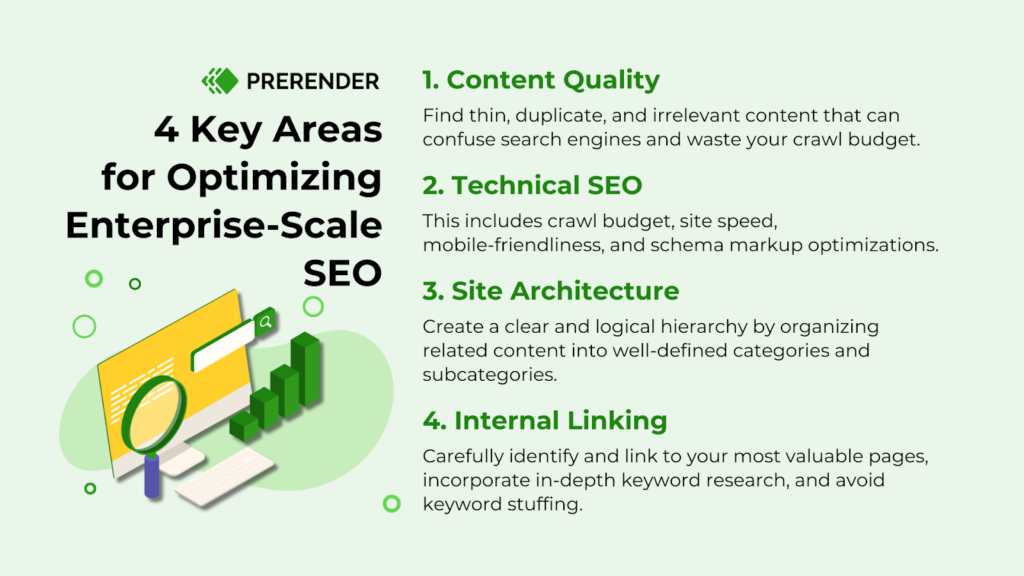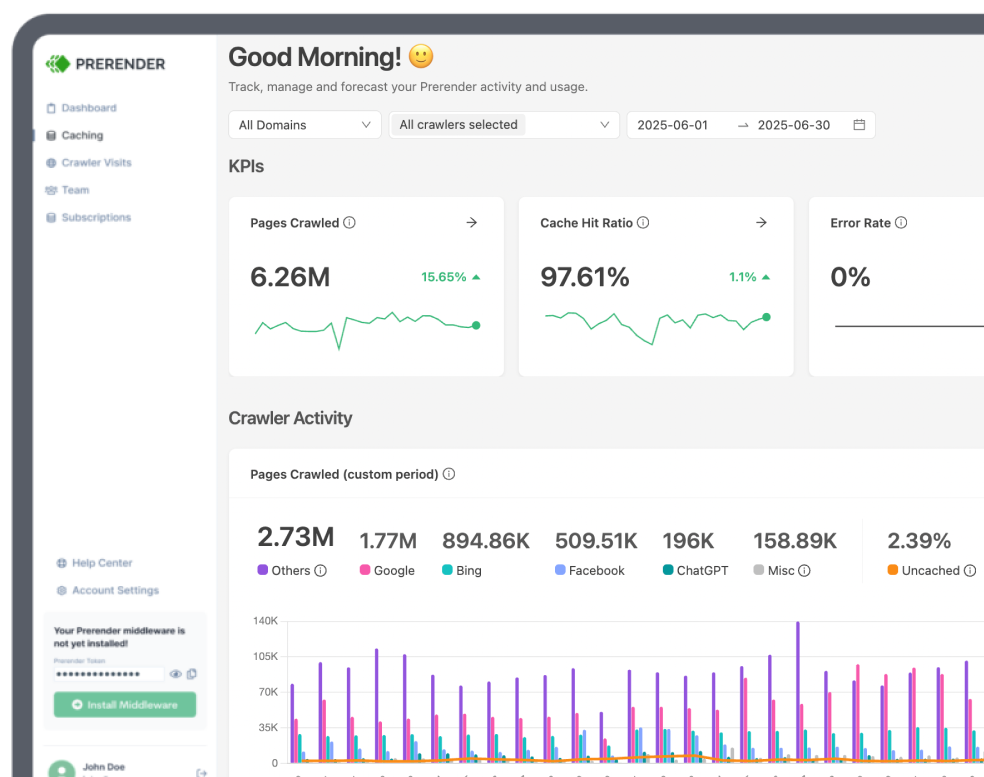Optimizing the SEO performance of a website with over a million pages, each containing hundreds of keywords, images, videos, and links, poses a significant challenge. Unlike smaller websites, large-scale sites demand a specialized approach to ensure they are indexed correctly and rank well in SERPs.
In this SEO tutorial, we’ll explore strategies specifically designed for optimizing massive websites, with a focus on JavaScript SEO performance. We’ll delve into technical SEO and site architecture. By mastering these essential SEO elements, you’ll be well-equipped to optimize your enterprise-scale website and significantly boost your organic search traffic.
The SEO Challenges of Large-Scale Websites
Before diving into the strategies, it’s essential to understand the unique challenges large-scale sites face regarding SEO. When dealing with millions of pages, SEO becomes a game of scale. Unlike smaller websites, where you can meticulously optimize every page, large-scale sites require a strategic shift.
Here are a couple of challenges large-scale sites face regarding SEO:
- Crawl Budget
Search engine crawlers have limited resources, and crawling millions of pages can quickly exhaust their crawl budget. This means that many pages may not be or only partially crawled and indexed, reducing the site’s chance to rank high in SERPs.
Related: What is crawl budget, and what role does it play in ensuring successful JavaScript indexing? Our free ‘Crawl Budget’ whitepaper can give you the answers.
- Site Architecture
Large sites often have complex site architectures with numerous categories, subcategories, and nested pages. These make it challenging for both users and search engines to navigate and understand the site’s structure.
- Technical Optimization
Enterprise-size websites often face greater technical SEO challenges, such as slow page load times, server response issues, and rendering problems. They can negatively impact both user experience and search engine crawling performance.
- Content Management
With millions of pages, managing and optimizing content becomes a monumental task. Ensuring consistency, relevance, and uniqueness across a vast content landscape requires a well-defined strategy and robust processes.
4 Key Areas for Optimizing Enterprise-Scale SEO
Given the unique challenges large-scale websites face, a comprehensive and scalable approach is essential for optimizing their SEO health. Rather than focusing on individual elements, prioritizing the following four key areas can yield significant results.

1. Content Quality
Not all pages are created equal. With a million-page website, you can’t afford to spread yourself thin. Identifying and prioritizing your most valuable pages, such as product pages, informative guides, and high-traffic landing pages, is crucial for efficient SEO efforts.
To optimize a large-scale site for SEO, you need first to conduct a comprehensive content audit. Website crawling tools like Screaming Frog can analyze all your pages, helping you identify thin content, duplicate content, and irrelevant pages that might confuse search engines and waste your crawl budget.
Related: Prefer not to use Screaming Frog? Visit our 10 Alternatives to Screaming Frog blog to find excellent SEO auditing tools.
But more importantly, a content audit helps you pinpoint your high-value content. These gems, which generate organic traffic, conversions, user engagement and support your brand message, will then become the foundation of your SEO strategy.
2. Technical SEO
Once you’ve completed a thorough content audit, it’s essential to address the technical SEO challenges that often hinder large-scale websites. A comprehensive technical SEO audit will help you identify and resolve issues that can impact your site’s crawlability, indexability, and overall Google search visibility.
To ensure optimal performance, focus on the following technical aspects:
- Site speed optimization
Large-scale sites can be notoriously slow due to the sheer volume of content and resources required to load pages. To combat this, you need to implement strategies such as caching mechanisms, image optimization, and code minification to improve site speed and reduce server response times. Learn more about caching and how it impacts your SEO health here.
- Mobile-friendliness
Given the increasing dominance of mobile devices in internet usage, ensuring your large-scale website is mobile-friendly is crucial for SEO success. Utilize technical SEO tools like Google’s Mobile-Friendly Test to identify and address any mobile usability issues, such as improper responsive design, unplayable content, or unreadable text. By optimizing for mobile-first indexing, you’ll provide a seamless user experience and improve your website’s search engine rankings. Visit our mobile optimization guide to get started.
- Structured data and schema markup
Structured data and schema markup will significantly improve your site’s visibility and click-through rates in search results. You have to implement schema markup consistently across your large-scale site, providing search engines with valuable information about your content, products, and services.
Pro tip: Unsure what schema markup you should implement on your enterprise-scale website? This schema markup guide can help.
- Crawl budget optimization
With millions of pages, it’s essential to optimize your crawl budget to ensure search engine crawlers can effectively crawl and index your site. This means you have to use strategies such as XML sitemaps, pagination, and canonical tags to prioritize your most important pages and prevent duplication.
- Improve JavaScript rendering
JavaScript presents a unique challenge for large-scale websites. When search engines crawl JavaScript-heavy pages, they must execute the code to see the content, which can significantly impact crawl efficiency and budget. This is particularly crucial for large websites where crawl budget optimization is essential.
Pre-Rendering: How to Overcome Technical SEO Challenges with Prerender.io
Large-scale websites often face SEO issues related to JavaScript, but Prerender.io provides an effective solution. This pre-rendering tool renders static HTML versions of JavaScript pages, improving both load times and indexing performance for users and search engine crawlers. Using a platform like Prerender is especially valuable for large e-commerce sites, content platforms, and enterprise websites with thousands of JavaScript-rendered pages.
By addressing common JavaScript SEO problems, Prerender.io helps optimize crawl budgets and enhances SEO indexing. Additionally, it can help with: improved Core Web Vitals (CWV) scores, a positive user experience, fewer costs compared to in-house server-side rendering, and the potential to mitigate sudden drops in traffic.
For real-time results, see how Prerender.io helped Haarshop, an ecommerce store, improve its indexing performance by 30% and increase its PageSpeed score to 99, leading to 50% more organic traffic coming to their large-scale online store. Get the details of Haarshop’s success story here.
3. Site Architecture
While site architecture for small websites is relatively simple, large-scale websites can become complex and confusing. Unclear navigation paths and cluttered hierarchies can hinder both search engines and users from understanding the relationships between pages, leading to inefficient crawling and indexing.
Once you’ve completed a thorough site audit and identified your most important pages, create a clear and logical hierarchy by organizing related content into well-defined categories and subcategories. This helps search engines understand the thematic relationships between pages and improves user navigation.
In addition, consider a flat architecture, which involves structuring your website with fewer hierarchical levels. This can make it easier for search engines to crawl and index all your content, ensuring that important pages have a minimal click depth.
4. Internal Linking
Internal linking is a fundamental SEO strategy that becomes even more crucial for large-scale websites. While small websites can benefit from basic internal linking, large websites require a more strategic approach to maximize their impact.
By carefully identifying and linking to your most valuable pages, such as high-traffic landing pages, product pages, informative guides, or category pages, you can distribute link equity and boost their rankings. This ensures that your most important content is easily discoverable by both users and search engines.
To further optimize your internal linking strategy, incorporate keyword research. Use relevant keywords as anchor text when linking to high-value pages to send positive signals to search engines about the content and topic. Avoid keyword stuffing and create a natural and intuitive link structure that benefits both users and search engines.
Implementing these strategies will ultimately drive more organic traffic and engagement across your website, enhancing its overall search engine visibility.
Improve Your Enterprise Website’s SEO Health with Prerender.io
Successfully optimizing the SEO of a large website with over a million pages requires a strategic approach. By prioritizing valuable content, ensuring optimal crawl ability, and building a strong backlink profile, you can effectively guide search engines in indexing your massive website and maximizing its visibility.
Here’s a quick rundown of how you should approach SEO for a website with hundreds of thousands of pages:
- Conduct an intensive content audit and prioritize your important pages.
- Implementing comprehensive technical SEO optimizations and using Prerender.io to solve JavaScript SEO issues.
- Develop a robust site architecture that’s easy for search engines and humans to understand.
- Craft an intelligent internal linking strategy.
Remember, SEO for large-scale sites is not a one-time effort but an ongoing process of analysis, optimization, and adaptation. By staying agile, data-driven, and focused on providing value to users and search engines, you can turn the challenge of managing millions of pages into a powerful competitive advantage.
Prerender.io is a solution that helps large websites optimize their performance in search results. Major search engines and AI crawlers can’t render JavaScript well. Unless you use in-house SSR or a solution like Prerender.io, your pages likely won’t be featured in their results.
Prerender.io fixes this in record time with little ongoing maintenance required. Create an account for free today!
How Does Crawl Budget Affect Large-Scale Website Performance?
Crawl budget determines how many pages search engines will crawl on your site within a given timeframe. For large websites, efficient use of crawl budget is crucial as it affects how quickly new or updated content gets indexed and how thoroughly search engines can crawl your site.
Can Prerender.io Speed Up Indexing For Large Websites?
Yes, absolutely! Prerender helps large websites get indexed faster by serving pre-rendered HTML versions of your pages to search engines. This eliminates JavaScript processing time, reduces crawl time, and allows search engines to discover and index your content more efficiently. This is especially valuable for e-commerce sites, content platforms, and enterprise websites with thousands of pages.
What’s the ROI of Technical SEO Improvements for Enterprise Brands?
Technical SEO improvements can offer significant revenue benefits for enterprise brands. To get a clearer number, we created a free ROI calculator to help you identify the tangible numbers of your technical SEO efforts. Calculate your revenue potential here.




